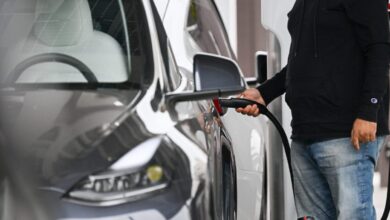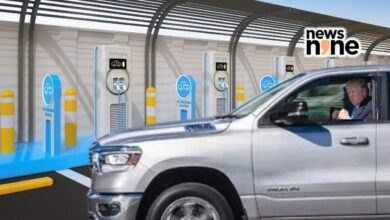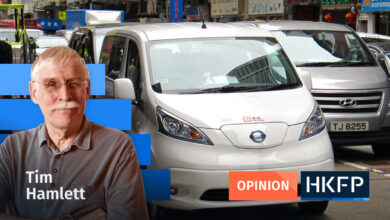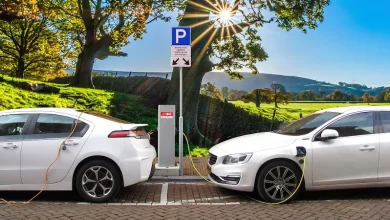Biden Escalates China-U.S. Trade War With Fresh Tariff Hikes On Electric Vehicles, Solar Cells, Chips And Steel
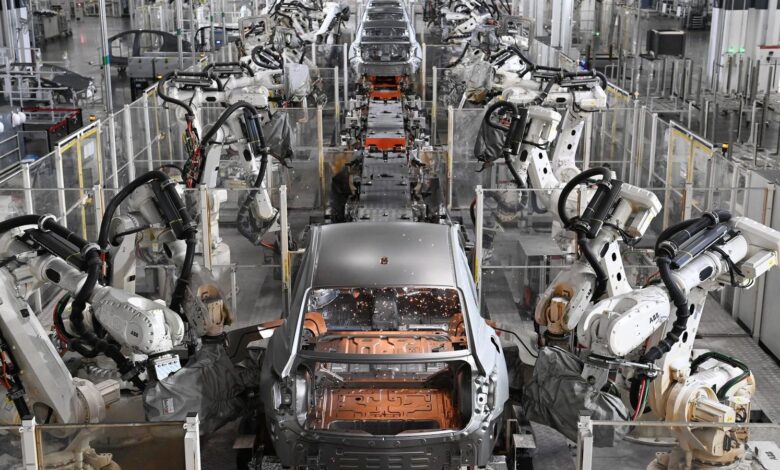
Topline
President Joe Biden on Tuesday announced hefty tariff hikes on a range of Chinese imports, including on electric vehicles, semiconductors, batteries and steel, part of an election-year effort to protect American industry amid growing fears Beijing is dumping a glut of cheap exports to shore up its own economy.
Electric vehicles will have a new 100% tariff, the White House said.
Key Facts
There will be a new 100% tariff on Chinese electric vehicles implemented this year, the White House said in a statement, a four-fold increase from the current rate of 25%, as well as a doubling of the 25% levy imposed on solar cells.
Tariffs on lithium batteries for electric vehicles are also set to increase from 7.5% to 25% this year, the statement said, with the levy hike broadening to cover all lithium batteries by 2026.
The White House also announced new tariffs on medical products like respirators and face masks, as well as steel and aluminium products, which will jump from a range of zero to 7.5% to 25% in 2024, as well as a new tariff of 25% for critical minerals, up from zero, and a 50% levy on semiconductors in 2025, double the current rate.
Some $18 billion worth of Chinese goods will be affected by the new rates, the White House said.
Though the move is likely to inflame already tense relations between Beijing and Washington, the White House said the new measures are necessary to curb “China’s unfair trade practices,” particularly China’s rampant “intellectual property theft” and habit of “flooding global markets with artificially low-priced exports.”
The move follows an “in-depth review” on the matter by U.S. Trade Representative Ambassador Katherine Tai and measures are “carefully targeted at strategic sectors” where the Biden Administration is making “historic investments,” the White House said.
Get Forbes Breaking News Text Alerts: We’re launching text message alerts so you’ll always know the biggest stories shaping the day’s headlines. Text “Alerts” to (201) 335-0739 or sign up here.
Key Background
Biden’s new tariffs mark the latest step in a years-long trade war between Beijing and Washington. In recent months, the oversupply of Chinese goods in key sectors like consumer goods, electronics, steel and construction, batteries and solar panels has sparked particular concern in recent months. China, the world’s second largest economy and its largest exporter, has leant into manufacturing as a means of exporting its way out of an economic slump. This is despite growing warnings from economists that the country must overhaul its traditional reliance on foreign markets to grow. Beijing, however, has challenged the notion that dumping its excess on global markets is a threat to other economies, accusing Western governments of protectionism, and in response to concerns raised by Treasury Secretary Janet Yellen in April, state media said Western countries have deployed the same tactics for centuries. In addition to fears of being undercut by cheap exports, Western leaders have expressed national security concerns over China potentially gaining a stranglehold on key supply chains, as fears Beijing will undercut green investment, stymying efforts to decarbonize the economy and tackle climate change.
Tangent
The U.S. is far from the only country concerned over China’s trade practices. The European Union, a bloc that is collectively the largest economy in the world, has followed in the U.S. footsteps in voicing its concern, particularly in green industries. It is investigating China’s trade practices for electric vehicle imports, particularly in light of massive state subsidies in the sector and the rapid growth of exports. After meeting President Xi Jinping of China in Paris early in May, European Commission President Ursula von der Leyen warned the EU will use all tools at its disposal to defend its economies if China does not play fair, stressing that the world cannot absorb Beijing’s surplus. “For trade to be fair, access to each other’s market also needs to be reciprocal,” she said.
What To Watch For
It’s not clear yet whether China will retaliate against the new American tariffs and further escalate the trade war between Washington and Beijing. Its leaders have not yet responded to the new levies.
